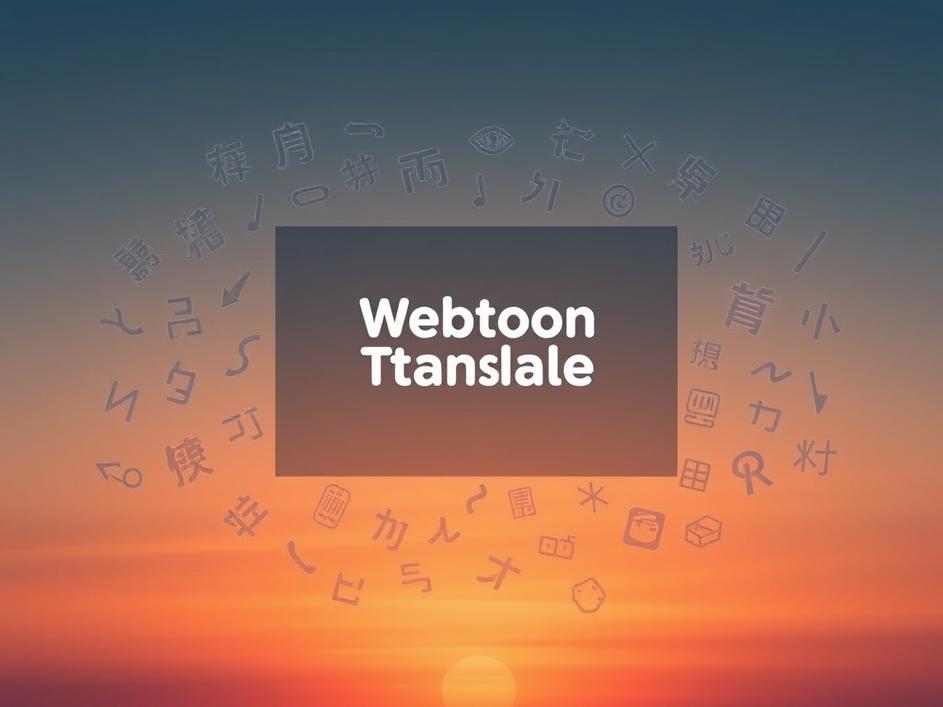


We are a digital agency helping businesses develop immersive, engaging, and user-focused web, app, and software solutions.
2310 Mira Vista Ave
Montrose, CA 91020
2500+ reviews based on client feedback

What's Included?
ToggleThe news dropped quietly, but for many webtoon readers and passionate volunteers, it definitely made waves. Webtoon Translate, a tool many fans used to enjoy their favorite comics, is officially closing its doors. This platform, which operated under Naver’s Webtoon Entertainment, gave countless fans a straightforward way to contribute to translating webtoons. Its whole purpose was to help bridge language gaps, making incredible stories accessible to a much wider audience across the globe. Now, it’s saying goodbye on November 2nd, a date that marks the end of an era for a specific kind of community-driven content sharing. For those who used it, worked on it, or simply benefited from it, this isn’t just about a website shutting down; it’s a significant shift in how some of the most popular online comics reach a truly global readership. It raises questions about accessibility, the role of volunteers, and the future direction of online comic distribution.
Think for a moment about how many amazing stories exist out there, but you can’t read them because of language barriers. That’s a common problem, especially in the fast-paced world of digital comics. Webtoon Translate stepped into this space to offer a unique solution. It wasn’t primarily about professional translators doing all the work, though their efforts are invaluable too. Instead, this platform was built around the idea of fan power. It was a place where people, just like you and me, who deeply loved these comics, could volunteer their time and skills. They would take raw text and transform it, panel by panel, speech bubble by speech bubble, into something readable for others. This incredible community effort made webtoons much more accessible, especially for those stories that hadn’t yet been picked up by official translation teams. It was a truly grassroots movement, powered by pure passion and a shared love for storytelling. It connected cultures, allowed new communities to form around shared interests, and highlighted the dedication of fans worldwide.
For the average reader, this news is, frankly, a bit of a bummer. It might mean that fewer stories will be available in their native language, or that they’ll face a much longer wait for official translations to catch up. Some niche webtoons, the hidden gems that might never garner enough mainstream attention to get an official translation, could now be stuck behind a permanent language barrier. That’s a real loss of potential discovery and enjoyment. For the fan translators themselves, the impact is likely even tougher. They poured countless hours into these projects, often fueled solely by their love for the comics and a genuine desire to share them with others. They built a collaborative spirit, helping each other out and refining their skills. Now, that dedicated platform, that shared space, is disappearing. It’s like a beloved community garden that was tended by its members suddenly closing its gates. It takes away a very valuable and direct way for fans to contribute, connect, and actively shape the content they adore, leaving a void that isn’t easily filled.
So, the big question is, why would a platform that fostered such a vibrant community and provided such a valuable service suddenly close? While Naver hasn’t publicly given all the detailed reasons, we can certainly make some educated guesses. One significant factor could be quality control. While fan translations are heartfelt and often very good, they can sometimes be inconsistent in style, accuracy, or pacing. Large official platforms like Webtoon might want to ensure a uniform, high level of quality and consistency across all their content, aligning with professional publishing standards. Another strong reason could simply be business strategy. Official translations cost money, yes, but they also offer a more controlled product and a clearer monetization path for the platform and the original creators. Perhaps Naver wants to push harder on its own professionally translated offerings, making sure revenue streams are clear and direct. It could also be about managing the complexities of user-generated content, copyright issues, or the sheer logistical challenge of overseeing such a massive volunteer effort. It’s a complex balancing act between fostering community engagement and operating a successful, sustainable business model on a global scale.
This closure doesn’t necessarily mean the absolute end of fan translations entirely, but it certainly marks a significant shift. Passionate fans, by their very nature, will always find ways to share the stories they love. We might see shifts to other unofficial platforms, perhaps more decentralized, community-driven efforts popping up on Discord servers, dedicated fan sites, or even through new, independent volunteer groups. But what it does signal is a potential turning point for big platforms like Webtoon. It suggests a clear move towards more centralized, officially managed translation efforts as the primary way content is distributed internationally. This approach certainly has its advantages, like potentially better quality, greater consistency, and a more streamlined process for creators to reach new markets. However, it might also mean a slower pace for less popular series or a reduced diversity of available content in certain languages. It puts more pressure on official teams to keep up with the overwhelming demand for global content, especially for the ever-growing number of new and emerging webtoons.
The shutdown of Webtoon Translate is more than just a footnote in the history of digital comics; it’s a moment to reflect on the immense power of community and the incredibly fast-changing world of digital content. It serves as a strong reminder of how much dedicated fans contribute to making stories truly global, extending their reach far beyond their original borders. While one door closes, the enduring spirit of sharing, connecting, and translating will undoubtedly find new paths and new forms. It’s a bittersweet goodbye to a platform that did a lot of good, enabling millions to enjoy stories they otherwise wouldn’t have. It leaves us wondering how the next chapter of global webtoon access will be written, and what new innovations might emerge. We’ll be watching keenly to see how Naver and other platforms fill this gap, making sure that truly great stories can still find their way to every single reader, no matter what language they speak or where they live in the world.



Comments are closed